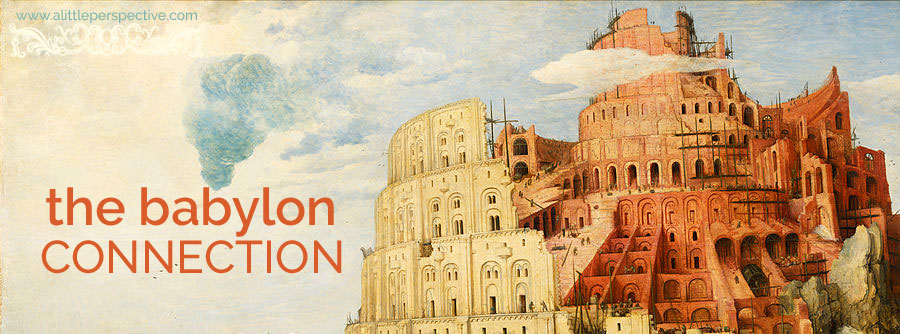the babylon connection
the babylon connection, part two
The first detail Josephus brings out regarding Nimrod and the Tower of Babel, was that God commanded the people to send out colonies, to spread out and fill the earth, and that in response to this command, Noah divided the earth among his grandchildren. The Scriptures confirm this, for in Gen 9:1, God said to Noah and his sons after they left the ark, “Be fruitful and multiply and fill the earth.”
Then in Gen 10:25, it says of Eber, a descendant of Shem: “To Eber were born two sons: the name of the one was Peleg, for in his days the earth was divided.” Peleg was among the fifth generation born after the Flood, and by doing some math, we can see that by the fifth generation, the eight persons which emerged from the ark would have by then become sufficient in number to send out colonies to fill the earth.
The second detail Josephus brings out is that the people refused to obey this command or go to their places which Noah had assigned to them, and that it was Nimrod who led them into this rebellion. The Scriptures confirm this detail, for it says in Gen 11:1-4, that the whole earth had one language, that the whole earth settled in Shinar, and that they began building a tower to prevent themselves from being dispersed over the earth.
That it was Nimrod who led in this rebellion, the Hebrew used in Genesis confirms, for Jones’ Dictionary of Old Testament Proper Names tells us that the name “Nimrod” means:
“Rebel,” “to be rebellious,” from the root maradh, to be rebellious, to be contumacious (Gen 14:4); to rebel against God, by worshiping idols (Josh 22:16); to oppose light (Job 24:13).
The Scriptures also confirm Nimrod’s leadership by making him the king of Babel in Gen 10:10.
Josephus further adds that the people thought that it was due to their own power and courage that they were prosperous. Power, courage, and strength or might, are the very characteristics which Scripture ascribes to Nimrod in Gen 10:8-11. It only makes sense that if Nimrod was the one to lead the people to rebel against God, it would be with reasoning that made the most sense to himself as an individual.
While the above might not be construed as “proof” in the classical sense, the fact that the evidence of Scripture is completely consistent with the details of Josephus examined thus far is an argument in favor of considering Josephus’ details examined thus far as historical.
the babylon connection, part four
the babylon connection, part five
the babylon connection, part six
the babylon connection, part seven
the babylon connection, part eight
the babylon connection, part nine
the babylon connection, part ten
the babylon connection, part eleven
the babylon connection, part twelve
the babylon connection, part thirteen
the babylon connection, part fourteen
the babylon connection, part fifteen
the babylon connection, part sixteen

5 thoughts on “the babylon connection, part three”
To what extent would Josephus have used the Torah to fashion his histories?
The Torah is the first five books of the Hebrew Bible: Genesis, Exodus, Leviticus, Numbers, Deuteronomy. We have the same books in our Bibles, but in English. I imagine Josephus referred to them quite a bit.
Hi Ms Miller,
Have not received your book yet, but after reading the bibliography you used and posted on NNP… I was wondering if you had ever considered using the Apocrypha or Pseudepigrapha. Also, would love to know your profesional opinion on the subject.
I guess I should have followed up with this question: what other sources would Josephus have used? Oral tradition? Or maybe the Book of Jasher (as cited in Joshua and 2 Samuel)?
I ask because I would expect his histories to "support" Scripture so far as Scripture had been his source. But perhaps that's not typical of Josephus' material…
As an aside: have you ever run across any material that gives credibility to the proposition that the "Book of Jasher" available today is the same one cited in Joshua and 2 Samuel? Any knowledge regarding the historicity of these documents?
Among biblical scholars, Josephus has always been considered a competent historical source. The Catholic Encyclopedia says of him:
"The fact that the "Antiquities" testifies to the truth of Divine Revelation among the Jews as among the Christians, and confirms the historical facts related in the Bible by the incontrovertible testimony of pagan authors, renders this work of Josephus of extreme value for the history of the chosen people."
http://www.newadvent.org/cathen/08522a.htm
Josephus used the Septuagint, the Greek translation of the Old Testament, as his source, as well as many classical authors with which he was familiar. He is also one of the sources for fragments of the Chaldean historian Berosus, considered by every academic I consulted as extremely accurate. No copies of Berosus' history exist today, but scholars have pieced together a little of what he wrote by the classical authors, such as Josephus, which quoted him in their own histories.
The Jews themselves did not consider the books of the Apocrypha as authoritative as the books found in the Hebrew Bible. They had the Apocryphal books, but did not include them in the canon of the Hebrew Bible when that canon was closed. There are some historical inconsistencies in some of the Apocryphal books, which Ussher mentions as they become relevant to his history. I am no expert on the Apocrypha, and since deciding which parts were historical and which were fable is beyond my scope, I did not use them as sources in Story of the Ancient World.